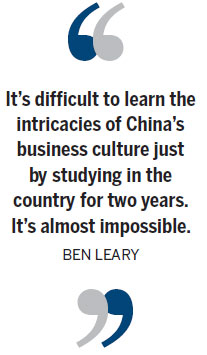Local savvy
Updated: 2012-03-23 08:43
By Todd Balazovic (China Daily)
|
|||||||||

 |
Business education gets a big boost in China as more Western students head east
It was only the hardiest adventurers who took up the chance to learn about the mysterious East when China first opened its doors to allow foreign students in 1950. Now, in an age where China is an economic powerhouse, foreign students have traded their backpacks and guidebooks for a suit and tie as droves of experienced professionals are seeking admissions in Chinese business schools.
Driven by the huge gap in the supply of internationally trained managers five years ago, thousands of foreign students from the United States and Europe are enlisting in Chinese MBA and EMBA programs in an effort to get an edge in China's increasingly competitive global business field.
But, unlike six years ago, the focus for business schools is no longer just learning about China. The goal posts have moved as rapidly as the economic tides have shifted.
"We are no longer the 'how to do business in China' supplier, we are the 'how to manage in fast growth markets' supplier to companies on a global basis," says John Quelch, vice-president and dean of the China Europe International Business School (CEIBS) based in Shanghai.
With China's Ministry of Education looking to attract more than 500,000 international students by 2020, the number of foreigners seeking elite MBAs akin to those obtained at internationally renowned schools like Harvard or Oxford is showing promising growth.
Leading the pack is CEIBS. In 2009, Forbes ranked the CEIBS business MBA program as the eighth among the top 10 non-US two-year MBA programs in the world.
|
||||
Since China's surge in business school enrollment in 2005, CEIBS has seen its number of foreign students almost double from 20 percent to 39 percent in 2011. Other top business schools in China, like Fudan University's EMBA partnership with Washington University and Tsinghua University's MBA program with the MIT Sloan School of Management have also seen positive results.
Detailed in the National Outline for Medium and Long-Term Education Reform and Development (2010-20), the Chinese government is making large endeavors to educate the next line of business leaders.
Because of their efforts, Chinese business schools have gone through one of the most rapid evolutions since the first Chinese MBA programs were initially offered in 1991, when just 90 Chinese MBA prospects enrolled at the first nine schools offering the courses.
But in the 20 years that followed, China has managed to develop a handful of some of the top sought-after MBA programs by partnering with prestigious US and European universities to develop a curriculum that conforms with the international standards.
Among China's most recognized is Tsinghua's IMBA program, developed in 1997 through a partnership with Massachusetts-based MIT Sloan School of Management.
Like most of the inter-university partnerships, Tsinghua's IMBA program is taught entirely in English and through partnership with the US-based school. Graduates are able to reap the benefits of having a joint degree from the top US business school and China's top educational institution.
"We've been receiving great help from the Sloan School on developing the curriculum and training our faculty. This has built the solid foundation of our MBA program," says Qian Yingyi, director of Tsinghua's School of Economics and Management.
With several foreign faculty and regular visits from MIT Sloan professors, Tsinghua has been to replicate most of the course material found at its partner school.
And, while the reputation of these MBA programs are often born out of partnering with Western schools which allows universities like Tsinghua to call upon the decades of business school teaching experience shared by established institutions like MIT Sloan, Chinese business schools are drifting away from their Western foundations. Rather, they are determined to differentiate themselves by capitalizing on the nation's unique global position.
In 2008, Qian and his colleagues started taking efforts to reform the program curriculum to focus on ethics, leadership development and to integrate hands-on experience - all elements he says that make the degree more China-centric.

 Relief reaches isolated village
Relief reaches isolated village
 Rainfall poses new threats to quake-hit region
Rainfall poses new threats to quake-hit region
 Funerals begin for Boston bombing victims
Funerals begin for Boston bombing victims
 Quake takeaway from China's Air Force
Quake takeaway from China's Air Force
 Obama celebrates young inventors at science fair
Obama celebrates young inventors at science fair
 Earth Day marked around the world
Earth Day marked around the world
 Volunteer team helping students find sense of normalcy
Volunteer team helping students find sense of normalcy
 Ethnic groups quick to join rescue efforts
Ethnic groups quick to join rescue efforts
Most Viewed
Editor's Picks

|

|

|

|

|

|
Today's Top News
Chinese fleet drives out Japan's boats from Diaoyu
Health new priority for quake zone
Inspired by Guan, more Chinese pick up golf
Russia criticizes US reports on human rights
China, ROK criticize visits to shrine
Sino-US shared interests emphasized
China 'aims to share its dream with world'
Chinese president appoints 5 new ambassadors
US Weekly

|

|










